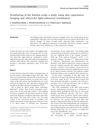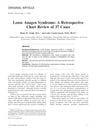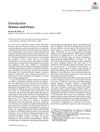 23 citations,
May 2016 in “American Journal of Pathology”
23 citations,
May 2016 in “American Journal of Pathology” The research suggests that a specific skin gene can be controlled by signals within and between cells and is wrongly activated in certain skin diseases.
 1 citations,
February 2024 in “npj digital medicine”
1 citations,
February 2024 in “npj digital medicine” Researchers improved a skin disease diagnosis model using online images, achieving up to 49.64% accuracy.
 1 citations,
March 2023 in “Clinical, Cosmetic and Investigational Dermatology”
1 citations,
March 2023 in “Clinical, Cosmetic and Investigational Dermatology” Current treatments for Alopecia Areata have mixed success, and there's a need for better, more accessible options and support for affected individuals.
 40 citations,
July 2013 in “Skin Pharmacology and Physiology”
40 citations,
July 2013 in “Skin Pharmacology and Physiology” Male skin gets drier and more alkaline as it ages, which may need different skincare than women's skin.
 9 citations,
January 2020 in “Postepy Dermatologii I Alergologii”
9 citations,
January 2020 in “Postepy Dermatologii I Alergologii” Frontal fibrosing alopecia is a poorly understood condition with increasing cases and unclear treatment effectiveness.
 April 2021 in “Journal of Investigative Dermatology”
April 2021 in “Journal of Investigative Dermatology” Photobiomodulation therapy may help treat hair loss in people with darker skin, but more research is needed.
 19 citations,
May 2007 in “Dermatologic therapy”
19 citations,
May 2007 in “Dermatologic therapy” The document concludes that various treatments, including laser therapy, are effective for managing pseudofolliculitis barbae, especially in darker skin types.
 February 2020 in “Acta Scientific Women's Health”
February 2020 in “Acta Scientific Women's Health” PCOS is a common condition in women that can lead to infertility and other health issues, and it's diagnosed by specific criteria with various treatment options available.
 23 citations,
April 2021 in “Journal of Clinical Medicine”
23 citations,
April 2021 in “Journal of Clinical Medicine” Frontal Fibrosing Alopecia's cause is unclear, affects mainly postmenopausal women, and current treatments focus on stopping hair loss rather than regrowth.

Children with alopecia areata often have low vitamin D, especially if they have darker skin, it's not summer, or they're not White.
 25 citations,
September 2014 in “Dermatologic Surgery”
25 citations,
September 2014 in “Dermatologic Surgery” Hair transplants can effectively treat hair loss from CCCA in African American women if there's no inflammation.
 1308 citations,
March 1998 in “Journal of bone and mineral research”
1308 citations,
March 1998 in “Journal of bone and mineral research” The vitamin D receptor is crucial for bone health and affects various body systems, with mutations potentially leading to disease.
 22 citations,
June 2002 in “Seminars in cutaneous medicine and surgery”
22 citations,
June 2002 in “Seminars in cutaneous medicine and surgery” Laser hair removal works well for people with dark hair and light skin, but it's less effective for light hair or dark skin; improvements are expected.
 19 citations,
July 2009 in “Clinical and Experimental Dermatology”
19 citations,
July 2009 in “Clinical and Experimental Dermatology” The study found that long-term sun exposure does not significantly affect follicular plugs on the scalp, and the scalp's appearance is unique compared to other body parts.
 94 citations,
October 2017 in “International Journal of Dermatology”
94 citations,
October 2017 in “International Journal of Dermatology” Lichen planus pigmentosus causes dark skin patches and is treated by avoiding triggers and using anti-inflammatory medications.
 13 citations,
July 2016 in “Pediatric Dermatology”
13 citations,
July 2016 in “Pediatric Dermatology” Loose Anagen Syndrome is more common in females and may be inherited, often confused with other hair disorders, and lacks evidence for biotin treatment effectiveness.
3 citations,
March 1998 in “PubMed” A woman's skin and hair conditions improved after her cancerous tumor was removed.
 December 2018 in “Lasers in Surgery and Medicine”
December 2018 in “Lasers in Surgery and Medicine” Science improves peace by advancing medical treatments, like laser therapies and non-invasive imaging.
 March 2021 in “CRC Press eBooks”
March 2021 in “CRC Press eBooks” Physical exams are important in hair loss diagnosis, considering cosmetic history, systemic diseases, and classifying alopecia types.
 7 citations,
October 2019 in “Elsevier eBooks”
7 citations,
October 2019 in “Elsevier eBooks” Maintaining skin health is crucial for overall well-being and involves protecting against environmental damage and using skincare products.
 6 citations,
March 2020 in “Anais brasileiros de dermatologia/Anais Brasileiros de Dermatologia”
6 citations,
March 2020 in “Anais brasileiros de dermatologia/Anais Brasileiros de Dermatologia” Most people in Turkey start getting gray hair around 33 years old, with factors like age, education, hair loss, skin type, family history, and anxiety playing a role.
 3 citations,
January 2022 in “Cutis”
3 citations,
January 2022 in “Cutis” Telemedicine is effective for diagnosing hair loss, especially in people with darker skin, during the pandemic.
 April 2024 in “International journal of women's health”
April 2024 in “International journal of women's health” Adult female acne is a complex condition that can worsen with menopause, requiring holistic treatment and tailored skincare at different life stages.
 November 2011 in “Informa Healthcare eBooks”
November 2011 in “Informa Healthcare eBooks” Environmental, chemical, mechanical, and personal health factors can all damage hair and contribute to hair loss or changes in hair quality.
 September 2023 in “Gynäkologische Endokrinologie”
September 2023 in “Gynäkologische Endokrinologie” Menopause causes skin and hair to become drier and thinner, but hormone therapy can improve these conditions.
 September 2017 in “Journal of Investigative Dermatology Symposium Proceedings”
September 2017 in “Journal of Investigative Dermatology Symposium Proceedings” A 73-year-old woman with Hypopigmented Mycosis Fungoides, a rare skin lymphoma, experienced disease progression despite treatment, emphasizing the need for ongoing monitoring.
 May 2023 in “Journal of Cosmetic Dermatology”
May 2023 in “Journal of Cosmetic Dermatology” Being overweight can cause or worsen skin problems in children, some more common in darker skin, and is often linked to insulin resistance.

Tailored nonsurgical cosmetic procedures are crucial for safely treating diverse skin types, especially skin of color.
 December 2022 in “Proceeding Bengkulu International Conference on Health”
December 2022 in “Proceeding Bengkulu International Conference on Health” Celery extract hair gel at 5% concentration is best for making hair gel.
 8 citations,
October 2019 in “International Journal of Dermatology”
8 citations,
October 2019 in “International Journal of Dermatology” The study concluded that combination therapy with topical corticosteroids and hydroxychloroquine or finasteride is effective in treating Frontal fibrosing alopecia in Asians.




























